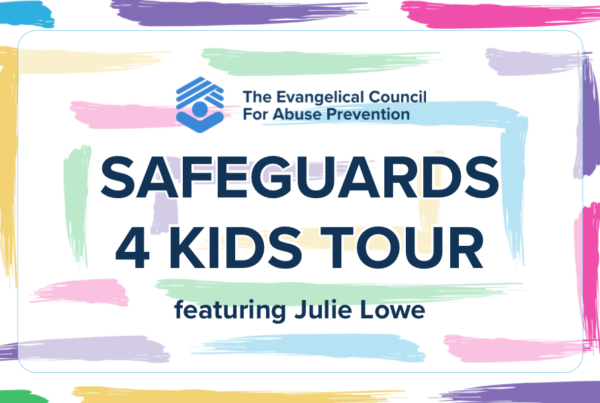O LORD, you hear the desire of the afflicted;
you will strengthen their heart; you will incline your ear
to do justice to the fatherless and the oppressed,
so that man who is of the earth may strike terror no more.
Psalm 10:17-18
Several years ago I was sitting in a pastors’ cohort that normally consisted of fellowship and conversation about theology and ministry. But on this day the conversation took a different turn. One of the pastors shared an incident of abuse to a minor that happened recently in his church. He immediately received pressure from people in his church to handle it “in house.” Getting legal authorities involved, they argued, would complicate the situation and threaten the future ministry of the church.
Thankfully, this pastor knew his responsibility, and acted courageously to report the incident to the police, then initiated a review of their child protection policies. Only after taking these steps, did he enter into the work of shepherding these families toward relational restoration.
I wish I could say this pastor’s approach is the standard response among evangelical leaders. Sadly, it’s often not. Multiple abuse investigations over the past several years have revealed that many churches and biblical counselors have attempted to handle abuse cases “in house.” Some continue to eye legal protocols and third party investigations with suspicion. As a biblical counselor who spent 20 years in pastoral ministry, this grieves me deeply.
This pattern has led victims of abuse to feel unseen, unheard, and unloved. Some victims are sent back to their abusers and told to “forgive and win him over with kindness.” Or they’re accused of overreacting, being too emotional, or provoking their abusers. Some who take action for their own protection or that of their children are brought under church discipline for failing to fight for the marriage at any cost. This is evil and tragic.
How does this happen? Why do some pastors and biblical counselors mishandle abuse? Let me highlight four scenarios which lead to this failure.
Scenarios When Pastors & Counselors Mishandle Abuse
When doing nothing masquerades as wisdom
Most pastors and biblical counselors have a genuine desire to care for the vulnerable in their churches. They are compassionate toward the suffering and desire to embody the heart of Christ. However, in the face of external pressures, the temptation to do nothing can easily masquerade as wisdom or thoughtful deliberation.
This often happens when a counselor tries to give equal weight to every consideration. But with abuse, some considerations must be prioritized over others. The protection of an abused spouse or minor is always the first concern, and must be prioritized over relational fallout, institutional protection, or financial considerations. Pastors and church-based counselors must not be governed by the many “what if” questions that will come from every direction.
- What if we get sued?
- What if people stop giving or leave?
- What if the victim is lying?
- What if the community finds out about this? What will happen to our reputation?
All of these “what ifs” are pushing toward the same conclusion: Don’t report the abuse. They assume the only safe options are to do nothing, bury it, or handle it internally. But the only safety they’re considering is that of the institution, not of the victim. A counselor who tries to give equal weight to every consideration will lose the clarity needed to protect the vulnerable.
When abuse cases are treated as relational restoration cases.
So many wives have been sent back to their abusive husbands with the admonition to restore the relationship. Counselors who give this admonition fail to understand the dynamics of abuse. They wrongly assume this is a normal conflict in which each person must recognize their own fault, confess their own sin, extend forgiveness and move toward reconciliation. They miss the power dynamic at the heart of abuse.
An abuser uses power to control his or her victims. Encouraging an abused spouse or child to seek reconciliation is sending a victim back into an oppressive system. Abusers are skilled manipulators who take advantage of the kindness and longsuffering of others. Relational restoration cannot be pursued until the abuse is confronted and stopped.
Matthew 18:15-17 is often misapplied when an abuse case is treated as a marriage restoration case. If the abuser offers a quick “confession” when confronted, this passage is then turned against the victim. If she is slow to offer forgiveness or restore the relationship she is treated as unrepentant. In these cases, church authority is used not to protect, but to punish the vulnerable. But this misses the larger context of Matthew 18.
It’s worth noting that prior to Jesus’ instructions on confronting sin in the church, we see his heart for the vulnerable in this passage. He teaches the importance of becoming like children (18:1-4), the severity of judgment toward those who cause little ones to stumble (18:5-6), the importance of not despising “one of these little ones” (18:10), and the Father’s will that none of these little ones should perish (18:14). These details should move us beyond a de-contextualized use of Matthew 18:15-17 and toward examining if we are truly heeding Jesus’ commands to protect the powerless and vulnerable in the way we exercise authority.
When reporting abuse is viewed as gossip.
When abuse is mischaracterized as normal relational conflict, those who report abuse are often accused of gossiping. They are reminded that the Bible calls us to go directly to those who’ve sinned, not to share it with a third party. But this is a serious misunderstanding of the Bible’s teaching on gossip.
Not all negative information about another person is gossip. Sometimes negative information is shared out of genuine love for others. Consider Paul’s negative words regarding Peter in Galatians 2. Paul’s aim was not to slander Peter, but to warn the church of the dangers of compromising the gospel out of the fear of man. Consider some additional examples from Scripture:
- Luke 12:1 (see also Matt. 16:6, 11; Mark 8:15; 12:38; Luke 20:46). Jesus warns against the leaven of the Pharisees to protect his disciples from false teachers and warn them to be on their guard.
- 2 Timothy 4:14-15. Paul warns Timothy against Alexander the Coppersmith who did him great harm. This warning is meant to protect a younger leader from a harmful man.
- 3 John 9-10. The apostle John warns the church against “Diotrephes, who likes to put himself first.” John is protecting the flock, by warning about an abusive leader.
It is not gossip when an abused wife tells a trusted friend the evil things done by her husband. Nor is it gossip for a pastor to report the abuse of a child by a children’s ministry worker (In fact, it’s his legal obligation as a mandated reporter).
This approach also misunderstands how abusers exploit the power disadvantage of their victims. In light of this, what are the ramifications of asking a victim to go directly to his or her abuser? Is it safe or wise for a 15 year old girl to confront her youth pastor who has made sexual advances? Is it safe or wise for a wife to confront her husband who uses physical threats to get his way? Is it safe or wise for a six year old child to confront his abusive mother? No. Victims need the help of third party advocates. That means they need the freedom to share their stories without the accusation of gossip.
When there is inherent mistrust of civil authorities.
Some pastors & counselors fail to report abuse because of an inherent mistrust of civil authorities. Sometimes this comes from a political ideology that the government has no right to intervene in the domains of church and family. Other times it’s rooted in the belief that secular authorities will use a report of abuse to publicly malign the church.
Both of these concerns are misguided. Abuse is both a morally evil and illegal act of coercion against another person. God has established civil authorities to restrain such evil. In Romans 13, Paul speaks of earthly rulers as an extension of God’s justice against wrongdoers.
Romans 13:3-4. For rulers are not a terror to good conduct, but to bad. Would you have no fear of the one who is in authority? Then do what is good, and you will receive his approval, for he is God’s servant for your good. But if you do wrong, be afraid, for he does not bear the sword in vain. For he is the servant of God, an avenger who carries out God’s wrath on the wrongdoer.
And this was not theoretical for Paul. He actually appealed to the provisions of Roman law to protect himself from physical mistreatment (Acts 22:25). Likewise, our local civil authorities are instituted by God to restrain evil and provide protection for the vulnerable. They don’t always do this perfectly, but nonetheless, God raised them up to do what the church cannot do– bear the sword in order to protect the vulnerable, punish wrongdoers, and restrain societal evil. This includes responding to physical and sexual abuse.
In response to the fear that the church will be publicly maligned, pastors & counselors must ask which brings more shame upon Christ’s church, an incident of abuse that is properly reported, or an incident of abuse that is covered up? Which response better reflects the heart of the Good Shepherd to a watching world?
Standards of Care for Biblical Counselors
Not all biblical counselors are the same. I’m encouraged to see a strong and growing commitment to best practices on abuse response in the Biblical Counseling movement. However, some still reflect the unhealthy views and practices listed above. Before committing to meet with a biblical counselor, do your research on his or her approach to issues of abuse. Here are some questions to ask:
What is your policy on reporting abuse?
Can you walk me through your standards of care for abuse victims?
Do you approach marriage counseling differently if there is past or present abuse in the marriage? If so, can you explain how you would approach it differently?
Do you believe a wife should submit to the demands of an abusive husband?
At Anchored Hope mandatory reporting is built into our standards of care training. In addition, we provide monthly training for our counselors with experts in various fields of counseling, including abuse prevention & response and trauma care. Because our counselors are located around the US, they’re expected to know the reporting laws of their state, and the state of residence for their clients. When in doubt, a counselor is asked to follow the law of the state with the highest standard.
A Word to Pastors and Biblical Counselors.
First, know that I’m for you! You are on the front lines of caring for people, and it often gets messy. Second, I’m growing with you. When I was a younger pastor, I was not aware of abuse dynamics and was ill-equipped to respond well. I’m thankful for the people and resources that have helped me grow in this area. But like you, my growth is not finished. Here are five reminders that can help us all grow in our response to abuse:
- Know your priorities. In cases of abuse your first priority is to act to protect the vulnerable. This means taking immediate action to report any physical or sexual abuse you witness or learn of. This must come before engaging in the long and complicated work of restoring relationships. In training our counselors at Anchored Hope, I’ve used the following principle: when it comes to protecting the vulnerable, we act fast; when it comes to final decisions about family relationships, we take it slow.
- Know your responsibility. If you are a pastor or a biblical counselor, you are a mandated reporter. Take time today to learn the mandated reporting laws of your state. Ensure that every person in your organization knows their responsibility as a mandated reporter. Establish a clear step-by-step reporting policy in compliance with your state. Build it into the regular training of your staff.
- Know when to slow down. Most states make a distinction between victims who are minors and adult victims in their mandatory reporting requirements. The abuse of a minor must be reported, because they usually cannot advocate for themselves. However, most states do not require this for adult victims. This is because there are times when acting too fast can put them in more danger. An abused spouse should be strongly encouraged to get to safety and call the police. Sometimes it is necessary for a third party to file the report. But it’s important for helpers to respect the agency of adult victims. Agency has been repeatedly taken from them by their abusers. Helpers need to take time to listen and understand how complicated it can be for victims to walk away. Abuse counselor Darby Strickland offers a needed reminder: “Keep in mind that the most dangerous time for a woman is when she is fleeing abuse.” Therefore, counselors should work with victims to create a plan that will provide a safe environment, resources, and a support network so they feel equipped to take decisive action. Victims need reliable support more than careless intervention.
- Know what you don’t know. Be humble enough to admit when you’re out of your depth and reach out for help. When it comes to abuse, pretending to be an expert can cost someone their safety or their life. Continue to educate yourself on abuse dynamics, trauma, and victim advocacy. Research the resources for victims in your community. Determine to build abuse prevention and response into your ongoing training as a counselor.
- Know your calling. Whether you are a pastor or biblical counselor you are called to reflect the heart of God in the care you provide. This means responding to abuse in a way that shows those suffering under it that,“The LORD is a stronghold for the oppressed” (Ps. 9:9).
Reporting abuse gives an opportunity for victims to be free from the actions of their oppressors, and experience the Savior’s tenderness in new ways. It can open up the space that will allow them to begin the long, slow journey of walking with Jesus toward freedom and healing. He came “to set at liberty those who are oppressed” (Luke 4:18). What a privilege we who counsel have to walk with the abused on that hope-restoring journey!
Helpful resources on abuse:
Abuse Prevention:
The Evangelical Council for Abuse Prevention
On Guard: Preventing and Responding to Child Abuse at Church by Deepak Reju (New Growth Press, 2014)
Abuse Dynamics:
Abuse Response Training & Resources:
Becoming a Church That Cares Well for the Abused. Brad Hambrick, Ed. (B&H Publishing, 2019)
Ministry Grid: Abuse Prevention and Response Training
Defining Gossip:
CT Article: Why Defining Gossip Matters in the Church’s Response to Abuse
The Role of Government:
Why We Should Always Teach Romans 12 with Romans 13 by Brad Hambrick
Must Pastors Report Abuse? Some States Aren’t Clear, But the Bible Is





